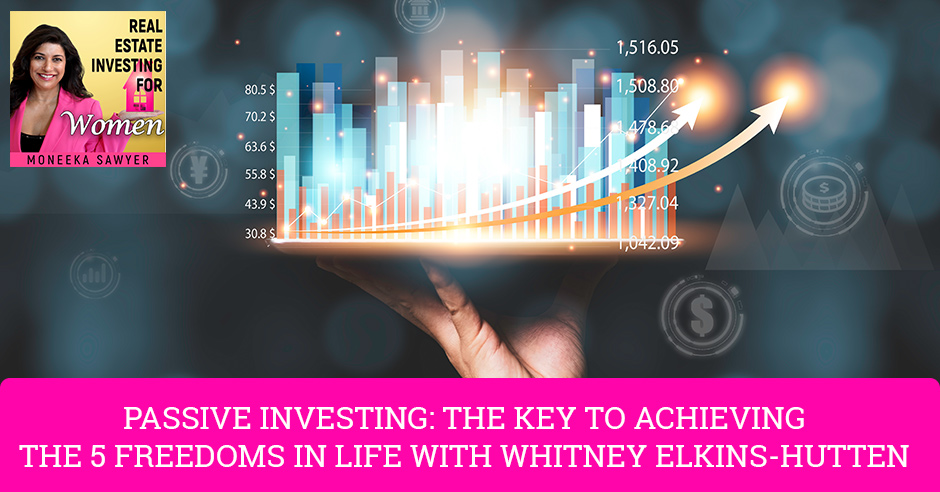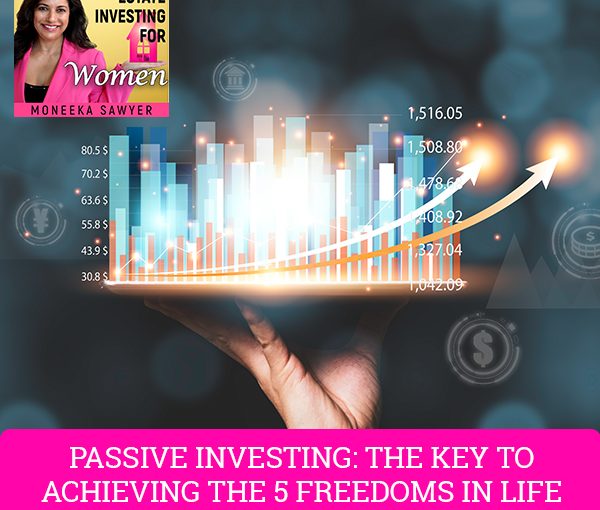Passive Investing: The Key To Achieving The 5 Freedoms In Life With Whitney Elkins-Hutten

Passive investing is one way to the five freedoms in life: freedom of income, choice, independence, location, and impact. When you get into passive real estate investing, you need to be sure of what you want, why you need it, and what you need to do to get it. Once you know those answers, you will be free financially and personally. Join Moneeka Sawyer as she talks with the Director of Investor Education at PassiveInvesting.com, Whitney Elkins-Hutten. Listen in as they discuss how you can achieve true financial independence in real estate. Learn why financial freedom isn’t the only freedom you need in life. Find out how to time block your calendar to make the most out of your time. Plus, discover how to get into real estate syndications. Tune in for more!
—
Watch the episode here
Listen to the podcast here
Passive Investing: The Key To Achieving The 5 Freedoms In Life With Whitney Elkins-Hutten
Real Estate Investing For Women
I am so excited to welcome to the show, Whitney Elkins-Hutten. She is the Director of Investor Education at PassiveInvesting.com and a partner in $700 million in real estate, including over 6,300 plus residential units and more than 1,400 plus storage units across 8 states. She experienced flipping over $4 million in residential real estate. That’s an awful lot of real estate, Whitney. Welcome to the show.
Thank you.
Whitney is one of these patient beautiful people we’ve had to reschedule several times. I super appreciate that you are even here. Thank you so much for that.
My pleasure. I’ve had to reschedule myself.
Whitney, could you give us the high-end version of your story? Why are you in real estate? How did you start? Give us the short and dirty version.
I started in real estate investing in 2002 by accident. I started as an accidental landlord. I bought a house with a significant other. About a month later, the relationship fell apart and the house and everything were in my name. I was terrified. I was like, “What am I going to do?” I was young and didn’t have a family at the time so I stuffed the house full of roommates.
The house also needed a huge rehab. There were psychedelic flowers painted all over the walls from the 1960s that had never been taken down. Poor layout, you name it. A green sheet was covering beautiful hardwood floors. My roommates didn’t mind living in a construction zone. As a matter of fact, I paid them a lot for beer, pizza and sushi.
We turned that house around in about eleven months. When I sold it was probably my number one investing mistake because I didn’t realize the power of real estate at that particular time. I had read Rich Dad Poor Dad and got it all wrong so I had to go back to school. What I did realize when I sold that property is I made more in eleven months than I did in my day job working 60, 70 and 80 hours a week in public health and traveling all the time.
I hadn’t been paying for my housing at all because my roommates had supported the majority of the bills with rent. I was like, “How many more times can I do this?” That term is called live-in flipping. I did a few more projects by myself and then my husband eventually joined me. Not all projects went extremely well. Maybe some people here have heard of the story where the bus fell into the roof of one of my properties. Yes, that did happen. Most people are like, “How does the bus fall on the roof?” On a mountainside, it will happen there.
Fast forward to ten years, I found myself not able to leave my day job. I didn’t have any more financial independence than I had started with. I had buckets of equity but I couldn’t pay my day-to-day bills consistently with that type of income. It dawned on me. A friend of mine mentioned to me one day, “Why don’t you keep those properties and put a renter in them with that land?” I scaled to about 30 properties. About a year and a half, single-family properties in-state and out-of-state.
Another problem is that I was able to step away from my day job to be at home with my family and our young daughter but my husband couldn’t because we couldn’t pick up properties fast enough. We hit another ceiling of achievement and had to learn how to scale through the larger multifamily property. We did it both actively and passively.
I quickly learned that I’m more geared toward the passive side of investing. That brings me to where I’m at. I’m still a partner in all that real estate that you named. However, one of my favorite investment vehicles is how to get into passive real estate like multifamily, self-storage, car washes, hotels and even real estate debt.
That’s what’s been able to afford my husband and me to have the five freedoms in life, freedom of income, freedom of choice, freedom of location independence and freedom of impact. That’s what I get to do here every single day at PassiveInvesting.com. As the Director of Investor Education, I help people realize those same goals for themselves. It’s a journey I took.

Passive Investing: Passive investing is one way to the five freedoms in life: freedom of income, freedom of choice, freedom of independence, freedom of location, and freedom of impact.
It’s so interesting that you did read Rich Dad Poor Dad. That’s the book that seems to start a lot of people on investing. You’re still like, “I’ll get rid of this one.” I have to tell you that I made a similar mistake. I hadn’t read Rich Dad Poor Dad at the time because it wasn’t out. That’s how old I am. I sold my first piece of real estate too. Years later, I was like, “What was I thinking?” We bought it for $200,000. It is now worth $1.75 million. That’s the way things go.
It was the second book for me and Cashflow Quadrant. I know Robert Kiyosaki goes over the cashflow quadrant in Rich Dad Poor Dad. I wasn’t in the space to absorb what he was trying to say there. I knew I had landed on something with real estate. I still had this thought that I have to put in all the work. That’s the only way that I can be rewarded. I have to provide all the value.
That’s not necessarily the case. It was more about how can you shift your income from trading time for money into either building your business or learning how to invest in other people’s businesses. It was about ten years after that when I hit the first inflection point. When we decided to start holding onto some of these properties that we were flipping, I read that book. It was a slap in the head.
Tons of bricks came crashing down because how many flips had I done before then that we hadn’t held onto? I’m like, “That would’ve been amazing if I could have kept them all.” We were buying with a low down payment. We had low-interest rates. We were able to use 203(k) loans for construction because we were living on the property. We were using the 121 exclusion, which is the 1031 exchange for real estate investors to keep our capital gains tax-free. How powerful would that have been if I was able to keep all of those?
I love this conversation, Whitney, as we’re starting together because I would like this to land with people. Much of the time, people that are reading this show understand real estate and what leverage is to a degree. It is hard to switch from the mindset of trading time for money to having your money work for you passively.
You work on the front end but then you let it work for you after, in a way, like hiring an employee that you don’t have to manage. There are a lot of people that have W-2 jobs that have a hard time making that switch. It’s interesting that you mentioned that even as a flipper, you were in real estate and still had trouble making that mental switch.
I have a lot of properties where I have tenants in them. They’re mostly passive. We know that as a landlord, if you’re managing your property, it’s mostly passive, not completely passive. I make a lot of rent and appreciation on those properties by doing very little work. Relatively, the trading time for money is very low. My ROI is huge for the time that I spend.
I am trying to move to fully passive. It’s even hard for me to go there because once you’re used to being in a way of doing things, it’s hard to go to that next level. I wanted to say that so that the ladies that are reading can see that if you’re having trouble fathoming this and taking that next step, understand that all of us, from the people at the very beginning to the people that have reached great heights in real estate, do have trouble making paradigm shifts when we’re going to the next level. Sometimes we need to hear, “It’s okay. You’re not alone. We all do this,” but it is necessary to make that paradigm shift to get there.
You talk about paradigm shifts but for me, it was my identity. The initial shift of being able to step into real estate and allow it to work for me. Shifting my active income from my public health job into being a real estate professional. I spent how many years in school and training, studying for board exams and all of that. I know that if I want to have true financial independence, I have to let that side of me go. It’s not that I will never do public health ever again. It’s just that I’m not a public health professional, I’m an active real estate investor. I have a lot of controlled property that I own and I use property management.
If you really want to have true financial independence in real estate, you have to shift your identity solely to real estate. Share on XAs I started unwinding some of that portfolio and shifting it into truly passive investments, passive with your time and income, that was another identity shift. Those core 30 single-family properties, my babies, I had trouble letting those go because I was like, “I’m a single-family investor.” That’s what I do. I knew if I needed to go to the next level, that part of me, I needed to shift my identity yet again to be a real estate investor. You get to create more impact in the world too whenever you do that. For me, it’s those 30 single-family properties. At one point in time, we were up to 52 between Indianapolis and Kansas City.
If you think about it from how I was paying my real estate taxes, I’m only impacting 2 areas and 52 households. Now, I’m across eight states and multiple cities in those areas. The taxes that I pay in those areas and the thousands of families that we’re able to impact, it’s a greater impact that I’m able to create. It is like Marie Kondo. You got to give that old you a little hug and then step into the new you to realize that full potential.
It is interesting because we’re evolving beings and we have so much potential to evolve as human beings but then also financially in our impact on the world and those sorts of things. You’re right. Every single time we step into that new identity, it’s a complete transformation. What also can happen to a lot of people is this Imposter syndrome. “I don’t belong here. I got all those degrees. That’s where I belong. I’ve been doing this for 40 years. This is where I belong.”
The thing is that nobody defines where you belong except you. I have often said, even about Imposter syndrome, that if you’re not failing it, you’re not going big enough. You’re not pushing yourself to that next level. When you push yourself to that next level is where you start to feel that doubt but you’ll get there. You did it the first time too.
To become the identity that you are now, you pushed. You did this education and all these hard things to become that person. Ladies, I wanted you to know this. Maybe it’s time for that identity shift so that you can go to that next level. You have 5 different kinds of goals that you look at in life and 5 areas of financial freedom. Talk to me a little bit about your perspective on goals, not financial freedom but five kinds of freedoms.
These aren’t concepts that I’ve created. These are things as a student of history. My dad was a History major and I rebelled against every museum he ever took me to. It wasn’t until he took me to Custer’s Last Stand in Montana that I was like, “I need to get this. I need to start studying the past.” Studying these great people so we can learn.
The reason is not that we will never make mistakes ever again, but so we can collapse time and get through those obstacles and mistakes faster. I know that was a little bit of a tangent but stick with me here. When I started hating those first levels of achievement, even with that first house, I’m like, “The first house went swimmingly. In the second house, I did everything wrong. What was happening?”
I essentially repeated the same thing but here I barely broke. My neighbor tenant who was living in a bus fell into the roof of the property the day after it sold. He’s pulling a shotgun on the police. I’m like, “What? I went off the rails somewhere.” It was because I hadn’t taken to heart the lessons that I could have been learning. I don’t have to learn them all myself. I can learn from other people.
Long story short, it was like, “Success leaves clues.” That’s one of the quotes that I love by Tony Robbins. Who can I learn from and start piling all these different pieces together? When I heard about the five freedoms in life, I was like, “That’s it.” When people said I’m pursuing financial freedom or financial independence, I’m like, “That’s one but there’s something else there for me to pursue.”
It can’t all be about money. I landed on choice in time but there’s still something else there for me to pursue. When I heard about the freedom of location and independence but more importantly, the freedom to create an impact, I was like, “That’s it. That is what I’m after.” Every time that you talk with an investor or a client and you start to uncover what they’re trying to achieve in life, it’s going to boil down to one or multiple of those freedoms.
That’s step one. What do you want? Which of these freedoms are you truly going to go after? Step two isn’t about re-engineering the math behind how to hit that freedom. This is where a lot of people sell themselves short. They’re like, “If I want to have financial freedom, time freedom and be a location independent, I need 20 houses to go hit $10,000 a month.”
That’s not the question you should be asking yourself. You need to understand how you want to feel when you hit whatever X goal is, financial independence or freedom of choice. You’ll always move the goalpost on the number of houses and the amount of income that you want to create. That’s how people go through life unfulfilled if they continue to move the goalpost. We all do it.

Passive Investing: You need to understand how you want to feel when you hit your “X” goal. Because people will always move the goalpost on the amount of income they want to create and that is how they become unfulfilled.
Whenever they can define how they want to feel, that’s when they understand what enough and fulfillment is. You can always do more. There’s always room to do more but you have to understand for yourself, “How do you want to feel whenever you do attain your goal?” Understanding, “What do you want? Why do you want it?”
We can start re-engineering, “What kind of mindsets and skills do you need to acquire? Whom do you need to have in your world? Does it have to be you that does things or can you hire it out and shorten your path even further?” Those are the three centering questions that I challenge anybody when they’re working through their goals.
As we decide on a goal or land on a goal, for this conversation, we need to decide on strategies that are going to help us to get there. How do you recommend people do that?
That would be in that third question. Who do I need to become to achieve the goal? Do I need to let go of an identity? Do I need to shift my mindset? What do I need to embody to be a real estate investor that’s bringing in $10,000 a month? I have to probably break those initial identities around being an employee who’s told what to do.
I’ve got to switch to an entrepreneurial mindset. Thinking through what are those mindset changes that somebody needs to make. This process can take a couple of hours in the afternoon to think through. Once I’ve made these mindset changes, I’m going to pretend that I am this entrepreneur that’s bringing in $10,000 a month. What kind of skills does that person need to have? They probably need to have some financial skills, goal-setting skills, team-building skills, relationship-building skills and negotiation skills.
In some way, processes around tracking progress and continually checking in with themselves. Not once a year, not every six months, not quarterly. Weekly or daily. Whom do you need to have in your world to make this happen? When we’re first starting, we’re probably the ones that are wearing all these hats as the operator of our business. I encourage people to think future state in 1 year or 5 years. Elevate yourself to CEO quickly, which means you shouldn’t be the one posting on social media or sending out networking emails. You might have to do that at the very beginning but quickly let go of that and start bringing people into your role to help you out with these things.
Think about how you’re using your time. I take people through a wonderful exercise on time management. It’s helping them color code their time and putting dollar amounts to the activities they’re doing in their day. The shift in thought can be overnight and very impactful when you realize that you’re doing a lot of things that are robbing you of money, as opposed to giving you wealth, not only financial wealth but personal wealth, health wealth and stuff like that.
You could be doing things that are actually robbing you of money as opposed to giving you financial and personal wealth. Share on XI’m super curious about the color coding your time blocking to see where you’re losing your time.
I would encourage the people who are reading to go and look at your calendar. Write everything down. Maybe you’re doing this retrospectively. It’s like doing a food diary. Nobody wants to write down, “I had a Snickers bar or I drank a Coca-Cola,” especially if they’re trying to lose weight. Do that. Write everything down.
How much time do you spend on social media, watching TV or doing all these things that you may not need to do to be successful? Once you have it all written down, this is about getting real with yourself. You’re going to go through anything that you’re getting paid $0 an hour to do and color code it brown. This might be mowing the lawn, washing dishes or doing laundry. I’m not going to beat up TV, social media or anything like that.
The next thing to do is to go through and do any of those administrative tasks that you have to get done. They are related to your business but there’s no exchange for money. Maybe it keeps the lights on. You would pay somebody $10, $15 or $20 an hour to do. Color code those in light green. There are going to be those activities whenever you step it up. They’re going to be networking events or meetings that only you can do but if you train the right person to do it, they can do it. Maybe those type of activities yields you $100 to $1,000 an hour. Color code those in the brightest green you possibly can.
You’re going to go through any of those activities that only you can do that you love doing and you’ll do $2,000 or more an hour. Color code those gold. If your goal is to spend more time with family or your health, those things are priceless as well. Color code those things gold. The first time somebody does this, they’re going to realize that their calendar looks like a pile of poop. It’s a lot of browns. We’ve given the context of where you’re spending your time.
What do we do? We try to reduce, eliminate or outsource as much as we can the brown things. Cut what you can. Get it all gone. It’s hard like going on a diet. Those things tend to creep back in. Automate whatever you can and then outsource. Do you have to be the one to mow the lawn? Do you have to be the one to do the laundry? We’re outsourcing to our daughter some of these things so she can provide value to our household. I love gardening. I know I don’t need to be shutting down the garden for the winter. I have somebody coming tomorrow who’s spending all day gardening. I get to tinker around with my little herbs.
The light green things are going to be the first virtual assistant that you’re going to hire. They’re going to take on all of those low-level tasks for not that much. Maybe you pay them $10 or $15 an hour. They’re going to get it done so much faster than you can because that is their primary job. As you start scaling your real estate business, you’re going to start bringing in more people or partners to help share the load on those bright green tasks.
What that does is it’s going to open up more time for you to bring in those yellow tasks, those conferences that you should be going to network, the deal-finding activities that you need to be doing to scale your portfolio, spending time on your health, your family and relationships with others. We’re starting to open up time. When people say, “I don’t have time,” it’s a clue that tells me that they haven’t done this inventory to understand how they’re spending their time.

Passive Investing: When people say that they don’t have time, that’s a clue that they haven’t time blocked their calendar. They really don’t understand how they are spending their time.
On the other side of that, when you free up a lot of your time and you say, “I don’t have time,” it’s more about examining, “Is that because this is something you don’t want to be doing?” You can take it on both sides of that. In the front end, you clear up a lot of that time if you’re still feeling like, “I don’t have time.” You do have time now for the things that are important to you. Are those other things not important to you?
Also, if they’re not in alignment with the goal. I sit down with my family once a quarter and do what we call a dream session. What are the things that we want to learn and experience and how do we want to give back? Those are the three key areas for happiness. There are so many things that I want to learn like language and playing chess.
I have 50 things written in those categories but I don’t have time to do it all. You continue still to have to make choices. The things that you still can’t make time to get, does it align with your goals? How bad do you want it? We’re centered back on those three questions. “What do you want? Why do you want it?” Sometimes you have to purge. Every year, I purge a lot of the activities that I thought would be cool to do. I’m like, “They’re not. I don’t want this.”
Thank you for that. That was super awesome. I’m going to try that. I love the visuals of the colors. Talk to me about real estate syndications, syndicators, operators, markets and all of that stuff.
I have a whole process. I have boot camps. People can reach out to me. It’s this little ten-minute primer. It’ll work for them because it is truly a process. The first thing to understand is syndication means group investing. A lot of people initially are like, “I don’t understand what syndication is. It sounds like the mafia.” It’s not. Syndicate comes from the Latin word “As a group.” As a group, how can we take down a larger asset?
Syndication means group investing, it's not anything mafia-related. Share on XWe split that group further down into limited partners and general partners. General partners are the ones that are going to be the day-to-day operators who run the business. They’re going to be sourcing the deal, underwriting the deal, acquiring the deal, raising capital and figuring out credit and lending. They’ve got all the brokers and lenders. They can get other investor capital pulled together. That’s their core business.
The limited partner’s job is to do three things. Vet the operator, market and deal. That’s it. Once they write that check, essentially, they still have other jobs because they’re in a partnership. They still need to read the communication, ask questions and be responsive to any needs that the general partner has of them. Largely, their day-to-day operation role is non-existent. They’re done.
This is a great way for somebody who’s a high net-worth individual and somebody ready to transition from having their controlled portfolio. They’re ready to fire Home Depot and their property manager and get their time back. This is a great avenue. It can even be a compliment to somebody’s portfolio. Maybe somebody loves doing this specific niche part of controlled real estate.
They want to have exposure to multifamily, self-storage, car washes and hotels but they can’t. They shouldn’t and they can’t go learn it all and be the expert in everything. They can invest with experts. That’s what syndication is. The first question in this process is, “Do you love real estate?” If you can’t check that box, this isn’t for you. “Do you believe in real estate?” That’s a better question. A lot of people here do believe in real estate already. We can check that box.
The next question is, “What are your goals?” Do you need cashflow, tax benefits, equity or diversification? I have a whole eBook that walks people through this exact process. You need to understand your risk. Do you want a class-A asset? No CapEx, no maintenance. Do you want more value to add or plus assets where there’s maybe a little bit of CapEx and deferred maintenance to work on but you get maybe a deeper discount on the property?
Are you swinging for the fences and you want a development deal or a heavy-value add opportunistic deal? There are different reward profiles and risk profiles for all of these different types of assets. You have to understand what fits best for you and your portfolio. That’s all the groundwork. You have to do that groundwork first and it doesn’t have to take long. I walk people through a process that takes them an hour to get all these questions figured out for themselves.
It is then the time to go look for operators. We’re looking for high-quality operators. One of my favorite ways to find operators is by going to conferences or meetups. You can do a simple Google search if you would like but you got to get good at discerning great marketing versus a great operator. Always get on the phone with the operator before you ever write a check. One of the number one investing mistakes I see limited partners do is that they love the operator. They’ve heard about them through a friend but they don’t get on the phone with them themselves to fully understand if this is the right person for them to be in partnership with.

Passive Investing: When looking for an operator, always get on the phone with them before you ever write a check. You have to know if they are the right person for you to be in partnership with.
We’re trying to figure out, “Are they genuine, authentic and transparent? Do they have a background in real estate? What is their track record? What exits have they currently produced for their limited partners? What are their biggest challenges have been?” We went through the COVID pandemic. We’re butted right up against heavy inflation and a recession. We’ve had all sorts of weather-related issues in the past couple of years.
There has to be some challenge that’s cropped up. I’m not looking for an operator that has had zero challenges. I’m probably more attuned to invest with an operator that has had challenges and overcame up well versus somebody who’s never had a challenge. What you’re doing when you go into passive investing goes back to that identity shift.
You’re no longer the day-to-day operator on a deal. You’re investing. According to Robert Kiyosaki’s Cashflow Quadrant, you’re getting into that self-employment category and shifting into that investor category where true financial freedom and time freedom are found. You have to get good at vetting operators. The other mistake I see limited partners make is that they get starry-eyed by returns on deals. I can put any number down on these papers guys.
I can show it to you but the operator is the one that has to deliver so you’re investing in people primarily with this type of strategy. Whereas before, you were the strategy and the person. Essentially, this was leveling up, becoming the CEO and back-filling with a Director of Operations or a CO to help build and scale your investment business. There’s a wealth of questions that you can ask an operator here. That gives you a high-level little primer on that but then you want to understand what markets they’re in. I encourage people when they’re moving into passive investments to be in markets where a lot of investing cards are stacked in their favor.
When you're getting into passive investments, make sure you are in markets where a lot of investing cards are stacked in your favor. Share on XI like metropolitan service areas, maybe in the primary area or the secondary area or 35 to 40 miles from the city center. There’s a lot of infrastructures there. There is going to be a lot of money put into these areas. Certain areas are scaling there. They’re becoming a tertiary market and they’re scaling to a secondary market. You can find those areas to be on the path of progress but we’re looking for areas where the population, income growing and jobs are growing and diversified. Crimes and poverty is coming down.
We’re also looking for areas that have good landlord-tenant laws, especially if you’re going into multifamily. Certainly, good tax laws because taxes are one of your number one expenses on any real estate asset. If we can be in those pro-business areas, that’s even probably a feather in a cap for an investment. There are tons of other questions there and resources that I can share with people on how to suss out good markets and then we get down to the deal. A lot of people are like, “Show me the returns and the money.” That’s not where we should start.

Passive Investing: When you get down to the deal, don’t just ask for the returns and the money. You need to first double-check the deal if it matches your goals.
We need to double-check that deal. Does it match our goals? Where do we want to be invested? How do we want to be invested? Equity, tax benefits, diversification, is it in the markets that we want to be in? We can start getting into the business fundamentals of the deal. Does it have the risk profile that we want to have or be exposed to? Does it have the time horizon that we want to be exposed to? Does it have a distribution schedule that works best for our finances monthly, quarterly or annually?
We can start getting into the return profiles on the asset. There’s a wealth of other things that people need to do to complete actual true due diligence when they look at a deal. Those are some high-level screening-type questions to help somebody get jumpstarted into passive investing. When they look at an initial deal, to understand in a few minutes whether that deal will work for them.
Is all of that covered in the book that you’re going to be giving my ladies?
Yes, and more.
Why don’t you tell us a little bit more about that book? Ladies, Whitney has been super generous. She’s giving you a digital copy of her book.
It’s called The Passive Investor Playbook. It’s the ultimate guide for hands-off investing. It’s a free eBook. You can go to PassiveInvestingWithWhitney.com. It’s a subpage on the PassiveInvesting.com website. Be sure to go to PassiveInvestingWithWhitney.com because that’s the only place where you can get this eBook. Once you read it, I also put together a short checklist for people, that way they can have that short checklist and do a quick screening on a deal in the future once they learn these general principles. There is an opportunity to schedule time with me and we can talk about all things real estate. I love it.
I love that. Thank you so much for your generosity in sharing that. This has been good. We went a little bit off-topic of what we were originally planning on talking about but I feel, Whitney, you’ve offered such valuable information to my ladies. I super appreciate that.
It’s my pleasure.
Ladies, one of the things I asked Whitney to talk to us about in EXTRA is car wash deals. This is something that nobody has talked about on this show and I’m super intrigued about it. We’re going to talk about investing in car washes and what that looks like. Stay tuned for EXTRA to know more about that. Before we go into EXTRA, let’s do our three rapid-fire questions. Tell us one super tip on getting started investing in real estate.
The super tip is going back to understanding the three questions. “What do you want? Why do you want it? Whom do you need to become to get it?” When you answer that third question, it’s mindset, skills and networks. That’s what you’re digging into. It’s not a one-and-done deal. Continue to ask those questions. If you’re just getting into real estate, do it once a quarter. Once you get solid in your plan, do it every six months. Eventually, you do that as an annual ritual.
Before you get started in real estate investing, you need to know what you want, why you want it, and who you need to become to get it. Share on X1) It’s going to take you time to land on what you truly want. 2) Your wants are going to change as you move those goalposts down. Those are the three centering questions. My family does that still once a quarter to double-check that we’re flying the right path. If you’re flying from LA to New York, the majority of the planes are always off-course. If you can continue to do small course corrections, you’re going to eventually get to your destination.
What is one strategy to be successful as a real estate investor?
Understanding very quickly that it’s a who, not how game. That can be from delegating, offloading, automating and also relationship-building. You don’t need to do this in a vacuum alone. With many of the people that I work with, that is a hard challenge. We’re brought up as employees to do your work. Even in school, do your work, stay at your desk and don’t look at the other person. That’s not how real estate goes. The quicker that you can understand that it’s a community, it’s a team and the majority of the people are working together to get deals done, you’re going to scale fast.
Thank you for saying it exactly that way. I love that. What is one thing that you do daily that you would say contributes to your success?
For me, it’s putting my oxygen mask on first. I get out of bed. I have a kid, a dog and a husband. The first couple hours of my day are all focused on me and getting my top priorities done. My priority is my health and my relationships. Also, what is the first goal that I need to do and tackle getting those things done? I sound like the Army commercial like, “We get more done by 10:00 AM than most people do in a day.” That’s pretty much what I do but it’s putting my oxygen mask on first, eating, getting those things done and moving those chess pieces early on in the day.
By 10:00 AM, if my day gets derailed, I’ve already won it. My day on Monday got derailed when we had to take my daughter into the emergency room. She’s fine. I had already been up for a couple of hours and I was like, “Here we go. We’re doing this.” It didn’t set me that far back because I had already moved a lot of those chess pieces pretty early in the day.
That is great advice. Thank you for everything you’ve offered on this show, Whitney.
It’s my pleasure.
We’ve got more. We’re going to be talking about car washes. I’m so excited. If you are subscribed to EXTRA, please stay tuned. If you’re not but would like to, go to RealEstateInvestingForWomenEXTRA.com and you can subscribe there. For those of you that are leaving Whitney and me, thank you so much for joining us for this portion of the show. I super appreciate you and I look forward to seeing you next time. Until then. Remember, goals without action are just dreams. Get out there, take action and create the life your heart deeply desires. I’ll see you soon. Bye.
Important Links
- PassiveInvesting.com
- Rich Dad Poor Dad
- Cashflow Quadrant
- PassiveInvestingWithWhitney.com
- RealEstateInvestingForWomenEXTRA.com
About Whitney Elkins-Hutten
 The beginning of my real estate career went better than most—my first ever rental in 2002 was a huge success. It was on my second deal that I almost lost it all.
The beginning of my real estate career went better than most—my first ever rental in 2002 was a huge success. It was on my second deal that I almost lost it all.
Those two experiences shaped my real estate journey into what it is today. Knowing there had to be a right way and that success always leaves clues, I studied the greatest real estate juggernauts and was able to replicate the personal finance and wealth creation strategies that they used to create financial freedom.
——————————————————
To listen to the EXTRA portion of this show go to RealEstateInvestingForWomenExtra.com
Learn how to create a consistent income stream by only working 5 hours a month the Blissful Investor Way.
Grab my FREE guide at http://www.BlissfulInvestor.com
Moneeka Sawyer is often described as one of the most blissful people you will ever meet. She has been investing in Real Estate for over 20 years, so has been through all the different cycles of the market. Still, she has turned $10,000 into over $5,000,000, working only 5-10 hours per MONTH with very little stress.
While building her multi-million dollar business, she has traveled to over 55 countries, dances every single day, supports causes that are important to her, and spends lots of time with her husband of over 20 years.
She is the international best-selling author of the multiple award-winning books “Choose Bliss: The Power and Practice of Joy and Contentment” and “Real Estate Investing for Women: Expert Conversations to Increase Wealth and Happiness the Blissful Way.”
Moneeka has been featured on stages including Carnegie Hall and Nasdaq, radio, podcasts such as Achieve Your Goals with Hal Elrod, and TV stations including ABC, CBS, FOX, and the CW, impacting over 150 million people.

